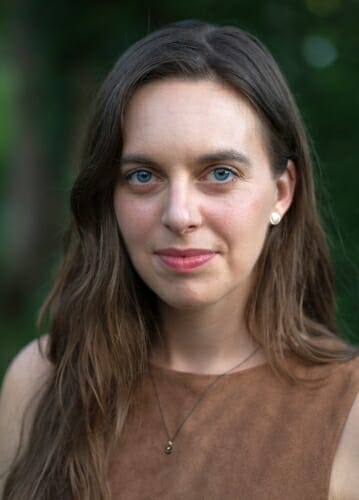New Faculty Focus: Morgan Edwards
Morgan Edwards, Assistant Professor, La Follette School of Public Affairs
Hometown: Chapel Hill, NC

Morgan Edwards
Educational/professional background: I do very interdisciplinary work, and that’s reflected in my background, which covers engineering, science, and policy. I received my Ph.D. in Engineering Systems from the Massachusetts Institute of Technology (MIT), my S.M. in Technology and Policy from MIT, and my B.S. in Environmental Science and Economics from the University of North Carolina at Chapel Hill. Previously was President’s Postdoctoral Fellow, University of Maryland
How did you get into your field of research? Since I was in high school, I knew I wanted to work on climate change. It’s a big, complex problem, and it amplifies so many other problems. At first, my plan was to go into energy and policy. Along the way, I kept noticing how the methods we use to measure the impacts of energy use can shape policy decisions in hidden but important ways. I wanted to understand how we can measure and track these impacts in ways that empower communities to reduce greenhouse gas emissions.
What attracted you to UW–Madison? I felt an immediate connection with the people here and the Wisconsin Idea, that research should solve problems and improve people’s lives beyond the classroom. I love being at a world-class research institution that is so deeply connected to communities throughout the state.
What’s one thing you hope students who take a class with you will come away with? Always read the ingredients of a policy analysis. Ask yourself who is behind the analysis and what perspective they’re coming from. Who benefits and is harmed when it’s used to make decisions? Who and what was left out?
Is there a way your field of study can help the world endure and recover from the COVID-19 pandemic that has affected the health, finances and lifestyle of so many? The climate crisis amplifies the effects of the pandemic, and vice versa. Look at the wildfires on the West Coast. They’re driven by climate change but made worse by a confluence of racial injustice, mass incarceration, and an ongoing pandemic. These overlapping crises show why we can’t compartmentalize complex policy problems. I think there are opportunities to address them together.
Do you feel your work relates in any way to the Wisconsin Idea? If so, please describe how. Yes! Here’s one example – I’m currently working on a collaborative project through the Holtz Center on community-based energy solutions in Wisconsin. We’ll be holding workshops that bring together community leaders and energy experts to explore pathways to meet Wisconsin’s goal of 100% clean energy by 2050.
What’s something interesting about your area of expertise you can share that will make us sound smarter during video chats (and eventually parties)? People at parties usually ask me what they can do personally to combat climate change. Many of them don’t know that the idea of carbon footprints – a process for estimating a person’s individual contribution to climate change – was popularized by the fossil fuel company BP. The problem is that it focuses attention on individual rather than structural change. There’s no one best way to help, but think about ways to get involved in collective action. There are lots of opportunities here in Madison and beyond.
What are you looking forward to doing or experiencing in Madison? I love all the opportunities to be outdoors, whether it’s biking, swimming, hiking, or rock climbing. I can’t wait to check out the Terrace soon. I’m also looking forward to exploring more of Wisconsin’s state parks.




